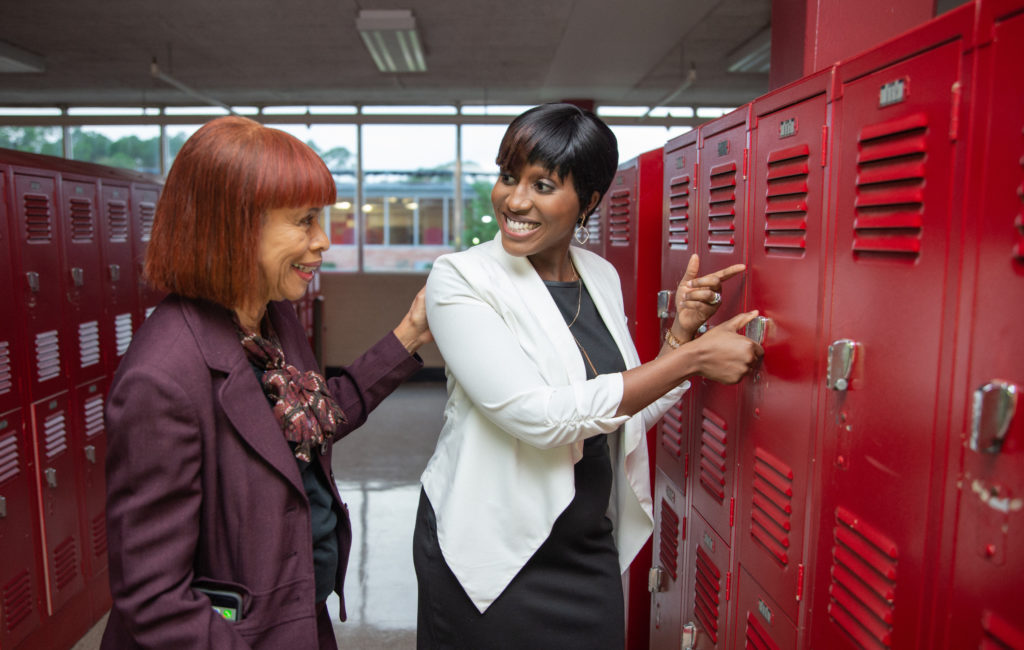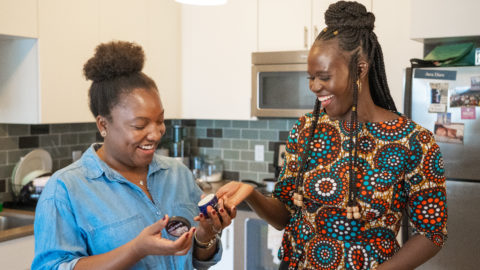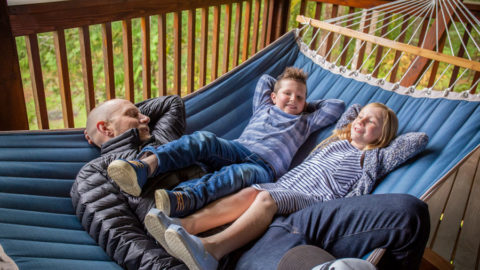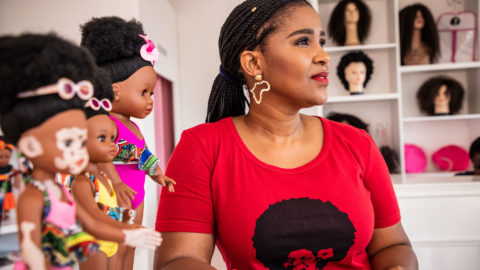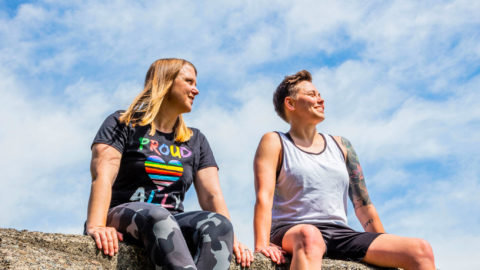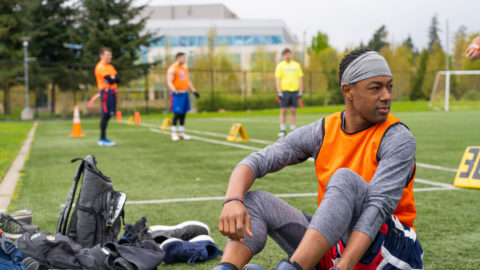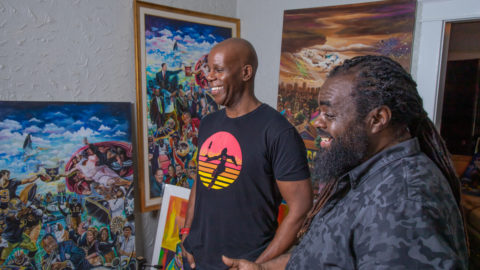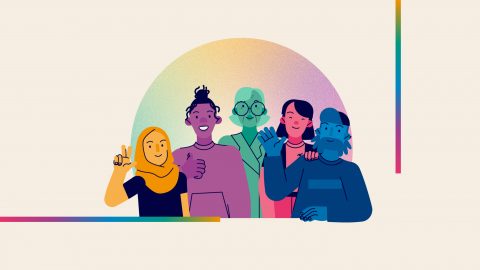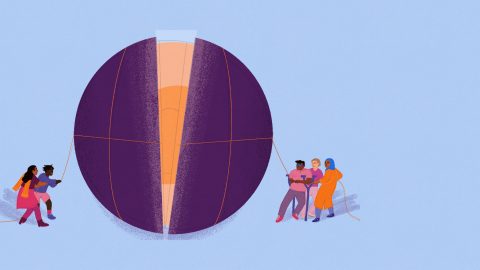The Jacksonville teacher with a time machine
Student India Powell was clear on why she wanted to attend a four-year college, but as the first in her family to do so, she couldn't see how to make it happen. Luckily, teacher Eris Northern possessed an uncanny ability to see into her students' future, and India's was full of promise.
The click of heels on the polished floor echoes through the empty hallway of William M. Raines High School. Two women walk by stacks of familiar red lockers and turn the corner. As India Powell reaches for the tarnished brass doorknob to Eris Northern’s old media room, the former student is transported back in time to when she was 15, opening this door for the first time. . . .
*****
India pushed open the heavy classroom door and found her way to an empty desk. It was the first day of media studies at her Jacksonville, Florida, high school. Last year, as a freshman, she had bugged the counselors nearly every day after school to make sure that she could get into Ms. Northern’s highly coveted, hands-on class that was available only to second year students. Now a sophomore, India looked around at TVs on rolling carts, VHS camcorders on tripods, and VHS tapes lining the bookshelf. In the front of the classroom stood Ms. Northern, soon to become a living legend to India and a part of her family’s history.
Ms. Northern started working at the high school in 1968, just a few years after it opened to an all-black student body. India’s “auntie” had been close friends with Ms. Northern in the 1960s, and India’s mom and sisters all had Ms. Northern as their librarian when they attended Raines. She’d heard that Ms. Northern was a tender and spirited southern woman with a knack for spinning a negative into a positive. The 15-year-old India—who aspired to be a news anchor—would also have the pleasure of Ms. Northern’s influence.
*****
“I don’t think I’ve ever seen you sit in a chair,” India says to her former teacher as they sift through a stash of old photos, yearbooks, and VHS tapes. It’s been a few years since India visited her alma mater. India tells Ms. Northern that she looks the same, that she always had her hands busy and was almost always behind a camera recording football games, assemblies, and school events.
They get lost in reminiscing, and as India uses her phone’s camera to snap a picture of an old photo, Ms. Northern says, “I just always knew you were going to make something of yourself, India. I just knew it.”
Throughout her career, Ms. Northern seemed to be able to travel in time to meet future versions of her students, encountering their very best selves, and returning to help students—with a nudge here, a question there, a little help any way she could—get from teenager to adult unscathed.
“Really ma’am? You knew it?” India asks her former teacher, voice cracking slightly. “I don’t know that I have really done it, but I am so proud that you saw something in me.” That’s how it goes with Ms. Northern. India wants to honor Ms. Northern’s powerful presence in her life, and instead, it’s Ms. Northern who gushes on India.
Just like she always carried a VHS recorder on her shoulders, Ms. Northern also held onto hope for each of her students, seeing their potential first. She’d reach out to any student, India recalls, even those who didn’t want to be at school or who got into fights.
“She’d say something like, ‘Hey you, come work this video camera for the football games. You’d be good at it.’ She’d just pour her energy into encouraging people to do things they never thought they could do, and then they’d succeed,” India says.

Proof point: years ago, Ms. Northern had an idea to combat the dropping graduation rate at Raines.
“I had the idea to start with the end in mind,” Ms. Northern says, her careful cadence of words drawing her audience in. “So we held a baccalaureate at the beginning of the school year. We ordered the caps and gowns for everyone. I don’t care if they were an F student or a C student—they all had a cap and gown. Then we marched.
“Guess where I was during the ceremony?” Ms. Northern asks India.
“Where?” India says.
“Behind the video camera,” answers Ms. Northern, grinning.
“Of course you were, Ms. Northern,” India says. “Of course you were.”
That year, the graduation rate saw the uptick that the administration and Ms. Northern were hoping for.
*****
India was the kind of student that teachers want to duplicate, according to Ms. Northern. “If you gave her a project, she would see that project through from beginning to end. Then, she’d talk the other students into believing that they could accomplish it as well.”
And now, she’s pleased that India has come back, proud that she’d consider what Raines and the people who’ve been a part of her life have done to help her.
“She’s not only looked back, but she’s embraced her history,” Ms. Northern says. “And for that, I am so proud.”
Since junior high school, India dreamed about going to a four-year college. She had her mother’s unwavering support, and they would do whatever it took to get her there, but India would have to figure out the steps. No one in her family had done it before.
“That’s one of the struggles I think can be intrinsic to some kids coming from single-parent homes like I did,” India explains. “Maybe they’re dependent on food stamps or government assistance. Maybe they have to work while in college, whereas somebody else can just focus on going to school. They just have different challenges than some people would. They need help to figure out that path.”
That’s where Ms. Northern stepped in.
Right before school let out for summer at the end of India’s sophomore year, Ms. Northern told India about a summer journalism camp at her alma matter, the University of Florida. India was excited until she realized that it would cost money. That’s when Ms. Northern told her not to worry, that they’d find a sponsor.
India rushed home to ask permission. Her mom said, “Absolutely! If Ms. Northern’s recommending it, we are doing it.”
That June, India headed south to a muggy Gainesville for the week-long journalism camp—one of the defining moments of her life.
“I hadn’t been many places outside of my hometown before that,” India says. “It just opened me up to a whole new world.”
India returned to her junior year infused with increased vigor. She was at the top of her class academically, an athlete, the president of her class, the school news producer, a community volunteer, active in her church, and worked two part-time jobs. Her applications to several colleges included one to the University of Florida, for which Ms. Northern wrote a glowing recommendation.
Although India “always knew the combination of hard work and God’s grace would open doors” for her, she still “freaked out, in the best way,” when she opened the envelope with the blue University of Florida emblem—she’d been accepted. Plus, she’d earned a full scholarship through a program that rewards high academic achievement in first-generation college graduates. She happily told Ms. Northern, who was not at all surprised. It was as if she’d known India’s future all along.
Ms. Northern was retiring after India’s senior year, and she established a scholarship for Raines students. The year that India graduated, she and four other classmates were awarded Ms. Northern’s $500 scholarship.
“She was still supporting me, even after I left high school. She did so many things to push me along, even when I wasn’t sure what direction I was going in.”
*****
India didn’t know if she wanted to work in journalism after college, but she knew that she wanted to boost other people’s stories—which she does working at Microsoft’s retail store in Jacksonville as someone who connects Microsoft’s resources to the community’s needs.
Ms. Northern once shared a phrase with India that’s stuck with her: “You know my glory, but you don’t know my story.” Knowing someone’s background or journey can deepen the understanding of their success.
“If I’ve learned nothing else from Ms. Northern, it’s being able to listen and talk with anybody, anytime, anywhere about their story, because that’s what she does. The work that she committed her life to is so necessary; who else would be able to tell the school’s history or understand the legacy of its people?” she says. “She documented their story so it can live on, even when she’s gone.”
To India’s surprise, a few months after their recent reunion at Raines she received a package from Ms. Northern—a Christmas present. She pulled out a DVD that was labeled “India’s videos.” Ms. Northern had compiled each of India’s reporter and news anchor appearances into one highlight reel.
India learned that the Northern family has been spending their own funds to convert Raines’s vast VHS archive (most of which Ms. Northern taped) to DVDs. “The woman’s dedication to her craft and community inspires me to this day.”
*****
Photography and videography by Katwon Turner.

